Top Tips for Choosing the Best Sewing and Thread
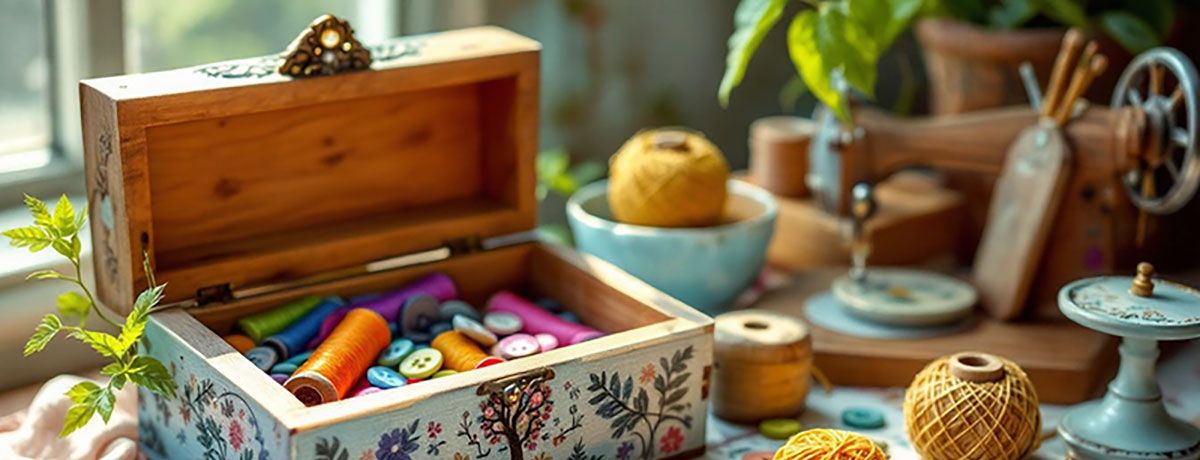
Want to know how to choose the best sewing and thread? In this article, you’ll learn about different types of sewing threads and how to select the right one for your fabric and project.
Key Takeaways
-
Choose threads based on fabric type and project needs for optimal results.
-
Invest in high-quality threads to enhance durability and prevent sewing issues.
-
Maintain an organized, well-lit sewing space to improve your overall sewing experience.
Understanding Sewing Thread Types
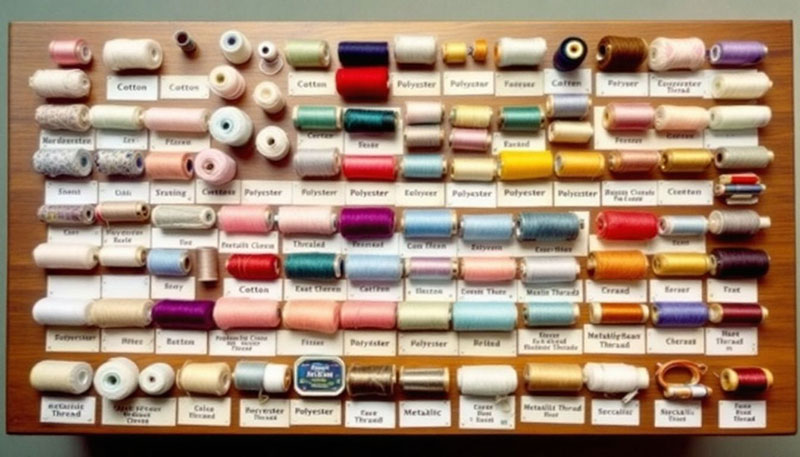
Sewing threads serve a dual purpose: they hold projects together and enhance their aesthetics. The variety of threads available can be overwhelming, but understanding the basics can help you make an informed choice. Personal preference and the type of fabric being used are crucial factors in determining the suitable thread for a project.
Choosing a thread that meets your durability and performance needs is vital before beginning any sewing project. High-quality threads from reputable brands guarantee consistency and optimal performance in your sewing projects.
Cotton Thread
Cotton thread is a favorite among many sewers for its natural, soft feel. Made of 100% cotton, this thread is perfect for delicate projects where precision and subtlety are key. While cotton thread has low stretch and limited strength, it excels in applications like decorative stitching and quilting. Its natural fibers blend seamlessly with cotton fabrics, making it an ideal choice for projects that require a gentle touch.
Whether you’re working on home decor, garments, or artistic crafts, cotton thread offers a classic look and feel.
Polyester Thread
Polyester thread is the go-to for general sewing projects due to its strength and durability. Unlike natural fibers, synthetic threads like polyester offer greater resilience, making them suitable for a wide range of fabrics. This thread type is particularly useful for garments that undergo frequent washing and wearing. Its versatility and availability in various colors make it a staple in any sewing kit.
For those starting their sewing journey, all-purpose polyester thread is a reliable choice.
Nylon Thread
Nylon thread stands out for its extra strength, making it ideal for heavy-duty projects. This thread type is perfect for upholstery, leather, and vinyl, where durability is paramount. Thicker fabrics require a robust sewing thread to prevent breakage, and nylon fits the bill perfectly.
Whether you’re reupholstering a sofa or crafting a leather bag, nylon thread ensures your project withstands the test of time.
Elastic Thread
Elastic thread is a game-changer for projects involving stretchy fabrics and waistbands. Thicker than traditional threads, elastic thread provides the flexibility needed to create gathers and shirring.
Often used in the bobbin alongside other threads for the top stitch, it ensures that your seams can stretch without breaking. This makes it ideal for activewear, swimwear, and any garment that requires a good amount of stretch.
Specialty Threads
Specialty threads bring a unique flair to your sewing projects. Heavy-duty threads are perfect for projects that require extra strength, such as bags and outdoor gear. Monofilament thread, often used in appliqué or upholstery projects, provides a discreet finish. Brands like Sulky offer decorative threads in a variety of colors, allowing you to add intricate embellishments to your work.
While you may not always need specialty threads, they can significantly enhance the visual appeal of your purpose thread projects.
Choosing the Right Sewing Machine Thread
Selecting the appropriate sewing machine thread is crucial for the success of your sewing projects. The right thread complements your fabric in terms of color, material, and thickness, ensuring a professional finish. Thread weight and ply play a significant role in the final look and durability of your seams.
Quality threads maintain uniformity in diameter, preventing breakage during high-speed sewing. High-quality thread minimizes fraying and tangling, making the sewing process smoother and more enjoyable.
All Purpose Sewing Thread
All-purpose sewing thread is versatile and suitable for almost every project. This makes it an excellent choice for beginners who are just starting their all purpose thread sewing journey.
All-purpose polyester thread, in particular, is recommended for stretch fabrics as it can accommodate fabric movement better than cotton thread. Brands like Coats & Clark produce reliable all-purpose threads that cater to a wide range of sewing needs.
Quilting Thread
For quilting, 100% cotton thread is the best option. It preserves the fabric fibers over time, ensuring the longevity of your quilts. Hand quilting threads are specifically designed for hand stitching, providing the durability needed for intricate quilting projects.
Using the right thread type for quilting can make a significant difference in the final appearance and durability of your quilts.
Jeans Thread
Denim thread is designed for heavy-duty applications, particularly sewing thick fabrics like denim. This thread type is ideal for top stitching on jeans, often available in a bronze color for a professional finish.
Using the right thread for denim projects ensures that your seams are strong and durable, withstanding the rigors of daily wear.
Overlocking Cones
Overlocking cones are essential for sergers, providing the strength and compatibility needed for high-speed stitching. Brands like Maxilock and Madeira are popular choices for overlocking due to their reliability and performance.
These cones offer a larger spool size, ensuring you have enough thread for extensive sewing tasks without frequent replacements.
Matching Thread to Fabric
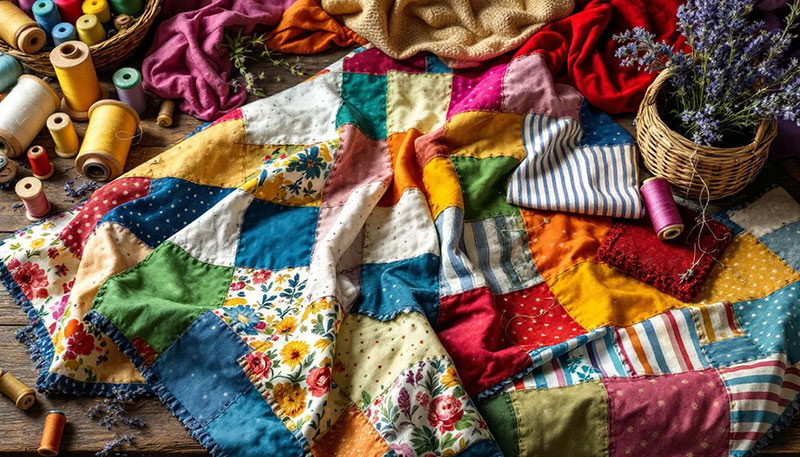
Matching thread to fabric is an art that can significantly impact the quality of your sewing projects. Threads can be synthetic, animal-based, plant-based, or a blend of these materials. It’s often recommended to match the fiber type of the thread to that of the fabric for the best results. Various properties, such as thread weight and finish, influence its application, making it essential to choose the right thread for your specific fabric.
High-quality sewing thread directly affects the performance and durability of your stitches.
Color Matching
Color matching is crucial for achieving a cohesive look in your sewing projects. Using a color wheel can help you select thread colors that complement or contrast with the fabric for desired visual effects. A neutral thread color can adapt to various fabric colors, while warm or cool tones can be chosen based on the fabric’s predominant hue.
A good guideline is to opt for a shade slightly darker than the fabric, especially with pastels and light fabrics, where lighter threads blend better. This approach enhances the overall aesthetic of your project.
Thread Thickness
Thread thickness plays a critical role in achieving the desired results in sewing. A 50 weight thread is commonly favored for both piecing and quilting projects. Quilting threads often come in heavier weights to accommodate multiple layers of fabric.
Jeans thread, for example, is usually thicker than standard threads, ensuring durability when sewing heavy fabrics. Understanding the appropriate thickness of thread for your fabric choice is essential for optimal sewing results.
Stretch Compatibility
Selecting a thread that matches the stretch properties of the fabric is crucial to prevent breakage during sewing. Threads with similar stretch properties to the fabric can prevent breakage and ensure seams remain smooth.
For stretch fabrics, choosing threads specifically designed to accommodate elasticity without breaking is essential. This ensures the integrity of your seams and the overall durability of your project.
Importance of Quality Sewing Thread
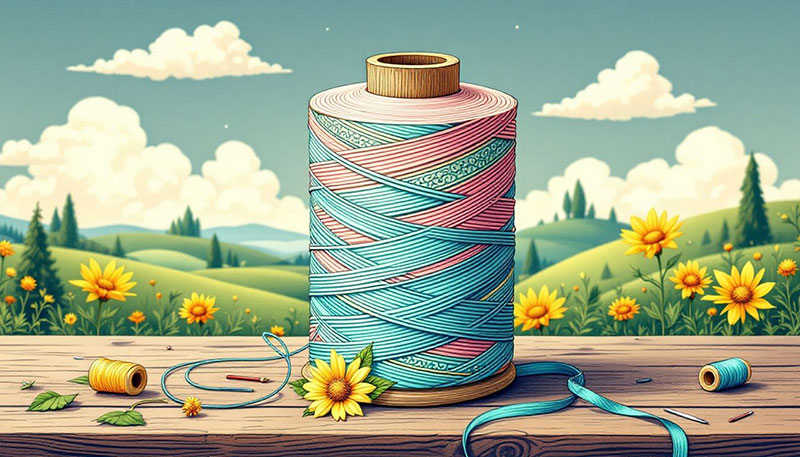
Investing in high-quality sewing thread can prevent frequent issues like thread breakage and fabric damage. High-quality thread significantly enhances the quality of your sewing projects, ensuring smoother workflow and fewer interruptions.
Recognizing reputable thread manufacturers can guide you towards higher quality and reliability in sewing threads. Trusted brands often produce specialized threads adapted for various market needs, ensuring consistency and optimal performance.
Avoiding Snapping and Tangling
High-quality threads are essential for successful sewing projects, minimizing issues like snapping and tangling. Longer staple cotton fibers produce less lint and are considered higher quality, enhancing the sewing experience. Using cheap quality threads often leads to issues during sewing, including thread snapping and tangling.
Choosing high-quality threads will save you time and frustration, ensuring a smoother sewing process.
Longevity and Durability
Investing in quality thread enhances the durability of finished garments, ensuring they withstand wear and washing. High-quality threads contribute to the resilience of garments, making them more durable over time.
Threads made from superior materials can last significantly longer, with some polyester threads lasting over a decade.
Trusted Brands
Choosing sewing threads from trusted brands can significantly impact the quality of your projects. GoldStar Tool is a reputable brand known for its high-quality sewing threads suitable for various projects. Buying from recognized brands reduces the likelihood of issues such as snapping and tangling, ensuring a smoother sewing experience.
Plus, purchasing in bulk from brands like GoldStar Tool can offer discounts, making it a cost-effective option for your sewing needs.
Reading a Thread Spool
Understanding how to read a thread spool is crucial for selecting the right sewing thread. Thread spools typically include details like fiber content, manufacturer information, and weight. Knowing these details helps you choose the proper thread for your fabric type and project requirements.
By understanding the information on a thread spool, you can ensure you’re using the best thread for your sewing projects.
Fiber Content
Threads can be made from various materials, each with unique properties that suit different fabrics. Cotton threads, for instance, are typically mercerized for improved dye absorption and luster, making them ideal for natural fibers.
Understanding the fiber content of threads allows you to select the right material for your fabric and project, ensuring optimal results.
Manufacturer Information
Choosing sewing threads from reputable manufacturers is essential for ensuring quality in your projects. High-quality threads from trusted brands reduce problems such as snapping and tangling, leading to smoother sewing experiences. Brands like GoldStar Tool are known for their reliable quality and comprehensive product lines, making them a preferred choice for many sewers.
Weight and Ply
Thread weight is expressed numerically, with a higher number indicating thinner thread, while ply refers to the number of strands twisted together to increase thread strength. Understanding both thread weight and ply is crucial for selecting the right thread for your specific sewing needs.
For example, lower numbers indicate thicker threads, which are suitable for durable materials, while higher numbers are better for delicate fabrics.
Essential Sewing Tools and Accessories
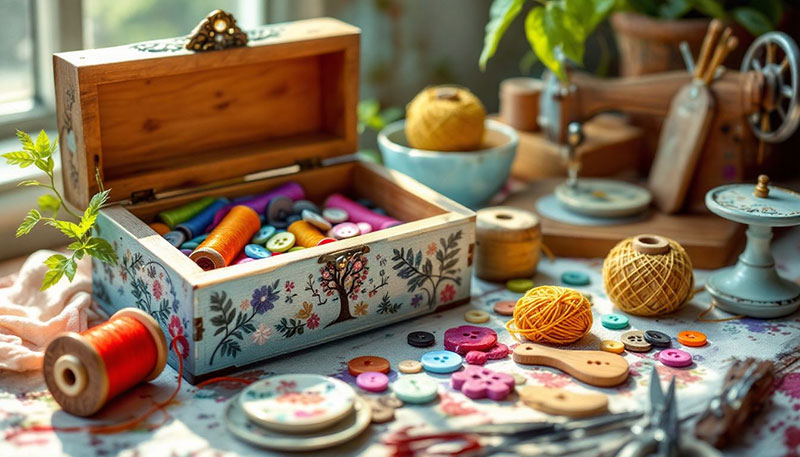
Having the right sewing tools and accessories can significantly enhance your sewing efficiency. Essential tools include scissors, measuring tapes, and seam rippers, which aid in precise and effective sewing. Overlocking cones are ideal for extensive sewing tasks, providing a large quantity of thread for continuous use.
A dedicated sewing machine table and proper lighting can also improve your overall sewing experience.
Sewing Needles
Selecting the correct needle is crucial for different types of threads and fabrics to ensure the best stitching results. Universal needles are versatile and suitable for various fabrics, making them a staple in any sewing kit.
Specialized needles like ball point, stretch, and jeans needles are designed for specific fabrics, preventing damage and ensuring smooth stitching.
Bobbins
There are over 60 different styles of bobbins, with the Class 15, L Style, and M Style being among the most common for household sewing machines. Using the correct bobbin style for your sewing machine is essential to ensure smooth operation and avoid issues like thread breakage and tangling.
Sewing Machine Maintenance
Regular maintenance of your sewing machine, including cleaning and oiling, is essential for optimal operation with various threads. Regular cleaning and oiling can significantly enhance your sewing machine’s performance and prolong its lifespan.
Keeping your machine in top condition helps prevent mechanical issues and ensures a smooth sewing experience.
Enhancing Your Sewing Space
Enhancing your sewing space with a dedicated sewing machine table, creative thread storage solutions, and proper lighting and ergonomic setups can greatly improve your sewing experience. A well-organized and well-lit workspace reduces strain and enhances focus, making your sewing projects more enjoyable and efficient.
Sewing Machine Table
An extension table significantly expands the working area of a sewing machine, making it easier to manage larger fabric projects. It also improves ergonomic comfort by aligning the sewing machine with the table, reducing strain on the neck and back during long sewing sessions.
More surface area allows for precise stitching, especially important for detailed quilting and embroidery.
Thread Storage Solutions
Using clear containers or wall-mounted racks for thread storage can help keep your workspace organized and clutter-free. Clear acrylic boxes allow for visibility while protecting threads from dust, and vertical storage solutions can save space and provide easy access to different thread types and colors.
Lighting and Ergonomics
An ergonomic setup, including adjustable furniture and proper lighting, is crucial for enhancing your sewing experience. Proper lighting reduces eye strain and improves visibility for detailed work, while ergonomic practices prevent discomfort and fatigue during long sewing sessions.
Summary
Choosing the right sewing thread is essential for achieving professional and durable results in your sewing projects. Matching thread to fabric, understanding thread types, and investing in quality threads can make a significant difference. Enhancing your sewing space with the right tools and ergonomic setups further improves your sewing experience. Remember, the right thread and tools are the backbone of any successful sewing project.
Frequently Asked Questions
Where should thread be when sewing?
When sewing, ensure the thread is properly positioned under the presser foot and through the tension discs to create clean stitches. Follow this guidance for a smooth sewing experience!
Why is it important to choose the right sewing thread?
Choosing the right sewing thread is crucial for the durability and aesthetic appeal of your projects, making your work stand out beautifully. Invest in the right thread, and you'll see a remarkable difference in your creations!
What is the best thread type for quilting?
The best thread type for quilting is 100% cotton, as it preserves the integrity of your fabric and enhances the overall quality of your work. Choose this thread for beautiful, lasting quilts!
How can I prevent thread snapping and tangling?
To prevent thread snapping and tangling, always choose high-quality threads and keep your sewing machine well-maintained. This will lead to a smoother and more enjoyable sewing experience!
What are some trusted brands for sewing threads?
GoldStar Tool is a trusted brand for high-quality sewing threads, ensuring your sewing projects are a success. Choose wisely and elevate your crafting experience!
Resources Page
- Elevate Your Craft with Top Stitch Thread: Gutermann Heavy Duty in Navy
- Stitching Success in Fashion: The Essential Guide to White Sewing String
- The Ultimate Guide to Choosing Hand Sewing Thread for Perfect Projects
- Mastering Bookbinding with Sewing Wire
- Cross Wound Thread vs Stacked Thread Unveiled
- Revolutionizing Garment Making with Waterproof Thread for Sewing: 30s/3 Spun Polyester
